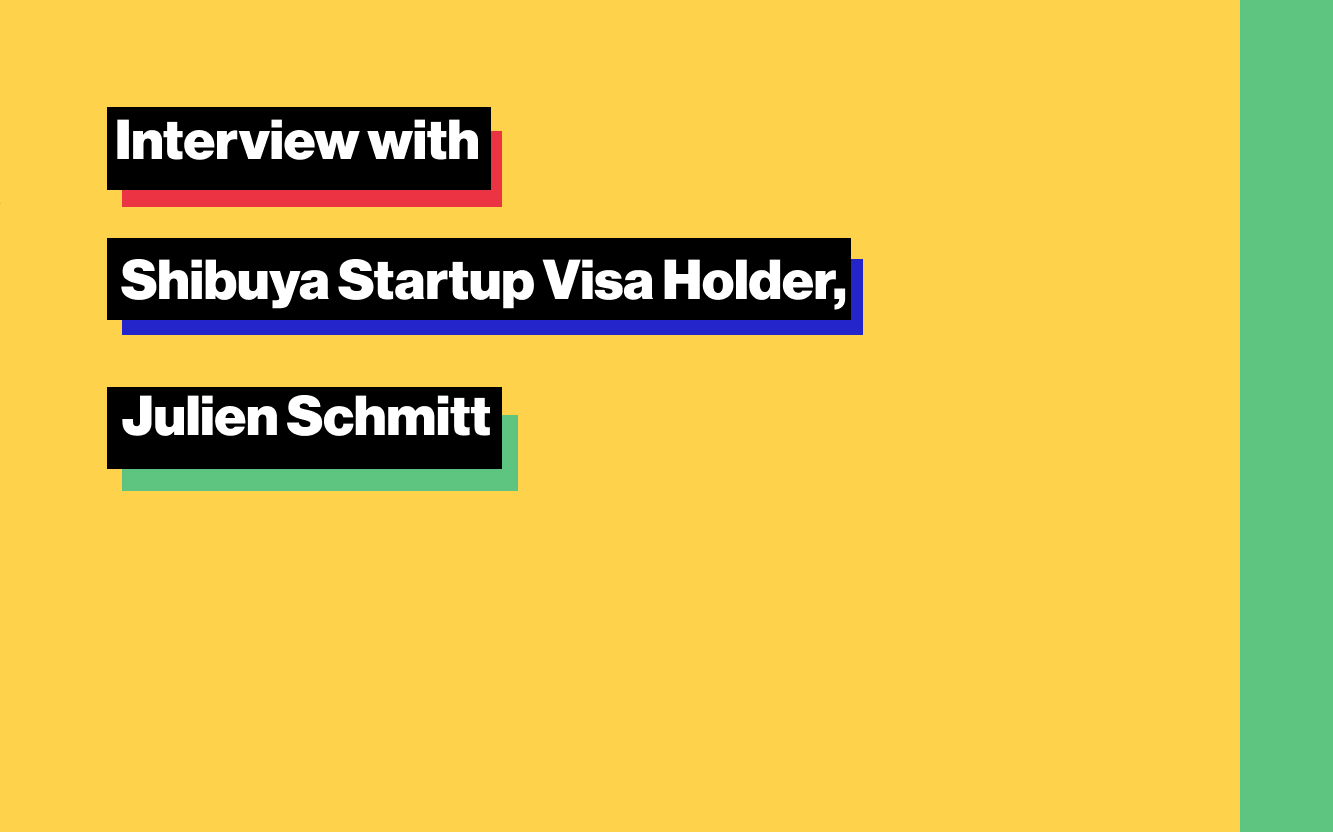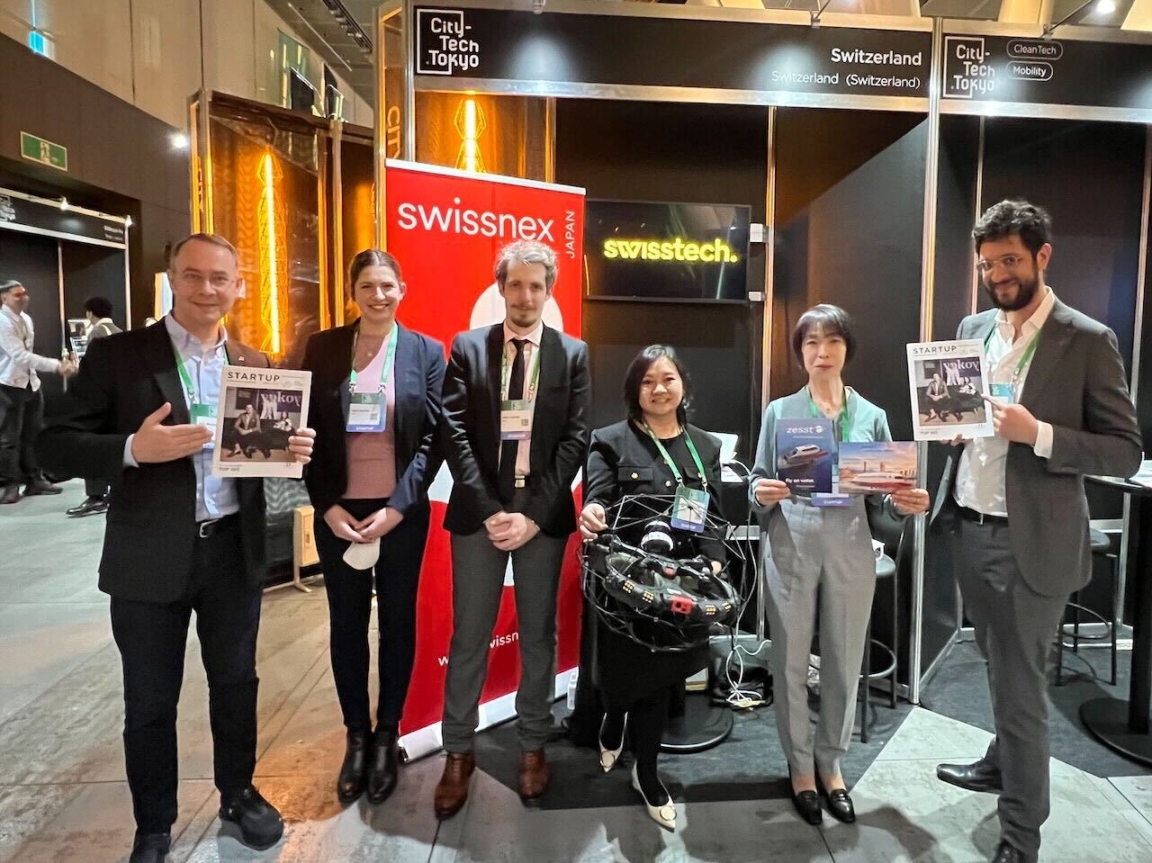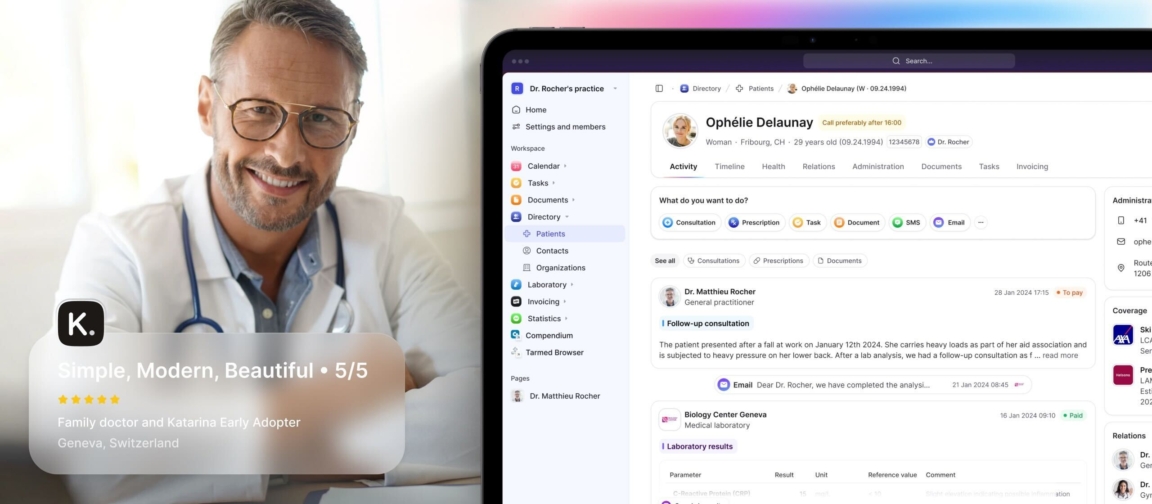


In this article, we sit down with Julien Schmitt, a Shibuya startup visa holder and marketing manager of Katarina, a digital health platform that aims to revolutionize the way we engage with health services. We interviewed him about his path starting own business in Shibuya, and his vision for the future.

(Photo: Katarina)
− Please tell us about your entrepreneurial journey.
My entrepreneurial journey kicked off at the age of 13, where I found myself managing UI/UX for online gaming platforms dedicated to fans of fantasy worlds and anime. I would create game forums, devise rules, handle both the design and coding, and also take charge of community management. By the time I turned 14, I was overseeing an active gaming community of around 1000 members.
Soon after, I delved deeper into the gaming industry, teaming up with a childhood friend who was a game developer. Together, we explored the reality of video game creation, an art form where story-telling mechanics and gameplay tricks always captivated me. I wrote scripts, crafted gameplay documents, designed GUIs, and collaborated on our first indie game. Around the same time, the rise of flat design, popularized by Windows 8.1 and iOS 7, and the demise of Windows Live Messenger steered me even more towards interface design.
In collaboration with the same game developer friend, we ventured into creating an alternative to MSN Messenger/Windows Live Messenger since transitioning to Skype didn’t quite appeal to us. Even today, I want to revive that software (laughs). It was essentially a precursor to Discord/Slack, integrated with multimedia, video games, an RSS news feed, and a third-party app marketplace. To put it simply, imagine merging Twitch, Steam, and Spotify into your Discord, with an overlay of an AppStore and open-themed channels — and this was back in 2013!
Following this, I was eager to upscale my interface design skills and take a more entrepreneurial approach, committing to finishing what I started. I took a significant step in my personal and professional growth when I moved to Japan around the age of 22, sustaining myself through freelance design projects. It was during this period that the current CEO of Katarina approached me, leading to my role as a co-founder, where I designed the initial interfaces for our medical software.

(Photo: Katarina)
− Why did you choose Japan?
There are a lot of reasons behind my decision, and they evolved significantly during my adolescence. Many French people were influenced by the TV shows of the 1990s, and I was deeply into anime. As I was really into video games and a devoted fan of Nintendo’s creations, I had a fantastic image of Japan.
Towards the end of high school, I began to focus more on the economic aspects of my projects. I had always perceived Japan as a technological haven, a place where everything is already done, and there’s nothing left to do — a realm where I could never contribute anything technologically relevant. With a heavy heart, I decided to abandon the idea of Japan and look for an alternative in Asia.
This was right in the midst of the Korean Wave (Hanryu), with the Korean GDP experiencing significant growth. I thought it might be a valid option for my projects. In addition, at the time I played Korean MMORPGs (Massively Multiplayer Online Role-Playing Games), especially those from Gravity, and had already taken on the task of redesigning the graphical user interface for these games. That’s why I decided to shift my focus completely to Korea. I also enrolled in college to study Korean and international business in the Asia-Pacific region.
Before my third year of university, I had planned an exchange to Korea and decided to take a two-week trip to Japan on Christmas Eve. After staying in Japan for two weeks in 2015, I was able to grasp some of the current situation of the Japanese technology sector and realize just how wrong I was! It may be subjective, but my personal feeling is that Japan is not just for travel purposes, but rather a place to live. Within a year of returning to France, I returned to Japan and made it my home.
− How has your startup evolved since its launch?
It’s important to note that our startup was born before the Shibuya Startup Startup program, originating in Switzerland — specifically in Montreux. Initially sparked by a conversation with Dr. Gilles Tardieu and Gregory Krieger, our CEO, our startup delves into the challenges doctors face in transitioning to digital platforms.
The existing solutions — relics from the 1990s — feature horrendous, impractical interfaces; particularly unsuitable for the younger generations. Considering that these systems have been in place for over 30 years, many individuals who started with these tools are on the verge of retirement.
Trust me, trying to train young medical assistants or Gen Z doctors on these outdated platforms would either result in laughter or prompt them to join a medical institution embracing modernized tools. But I digress!
We’ve gained substantial experience with the startup, fostering enduring relationships with the medical community in Europe. Our medical software dedicated to doctors has given rise to new solutions, such as software tailored for medical analysis laboratories. During the COVID period I returned to Europe, and it was then that I conceived the idea of opting for the Shibuya Startup Visa to prepare for internationalization and establishing lasting connections with the Asia-Pacific region, especially Japan, where I already had some knowledge of the market.
Here, unless you’re Apple or Microsoft, you can’t just arrive with money and expect to generate adoption and trust. Relationship-building is a different process than in Europe, takes a considerable amount of time, and is more inherently human in many ways. The Shibuya Startup Visa truly assisted us, providing a foothold, connecting us with other founders, sharing its network when possible, and fostering trust with our prospects. Today, we have a solid foundation to prepare for international expansion, armed with a new platform designed to enter global markets organically.
− What kind of steps did you take to apply for a Shibuya Startup Visa?
We decided to apply for the Shibuya Startup Visa during the challenging period of the Coronavirus pandemic, specifically in the second year. This posed significant difficulties as it coincided with border closures and really strict regulations in Japan.
At that time, we had to secure an invitation from a sponsoring company to support our application. The application process necessitates having an action plan for the upcoming year (to be updated after 6 months, of course) to provide a vision for your project. Additionally, a business plan for the Japanese entity is required. While many startup founders, especially those from newer generations, might feel daunted by the administrative aspects of this, consider it a necessary step for your greater good. Japan operates as a bureaucracy where paperwork and contracts reign supreme, immersing you directly into this environment.
Moreover, it serves as valuable training in clarifying your company’s purpose, your project, and how you manage your finances. Look at it as a tutorial on effectively maintaining your business. As you progress in your startup journey and pitch your ideas to investors, the creation of such documents becomes a proactive necessity, so it’s beneficial to get ahead of the curve.
− What are your next steps?
After spending over 5 years in Japan, I’ve come to understand the challenges faced by foreigners in finding healthcare professionals. Language barriers, applications exclusively in Japanese, and not-always-functional credit card payments motivated us to create a new platform, which has already been launched.
The goal is to assist travelers and expatriates in accessing healthcare that they can pay for online, with doctors and healthcare professionals who speak their language and are willing to accommodate them.
I’m not sure if you realize how challenging it is to find a dentist near you who speaks at least viable English and with whom you can establish a long-term health relationship here, and I am not even talking about more serious health cases where communication is vital for your treatment.
This new platform is a healthcare marketplace: healthcare professionals will have the opportunity to showcase their medical services as if they were an online store, simplifying the connection with new patients. It’s a fresh channel for them to attract new patients who currently face unsolvable pain points, not just in Japan but across Asia, and to some extent, worldwide.
− Could you share a message for founders and startups who want to apply for Shibuya Startup Support or are simply interested in the Japanese market?
Absolutely. Whether you’re eyeing the Japanese market or considering applying for a visa through Shibuya Startup Support, the message remains the same. Japan is gradually awakening to the potential of startups; investing resources and striving to become more dynamic in this space. With an increasing number of dedicated events and investors, Japan is fostering a startup-friendly environment.
In contrast to other developed countries that have embraced a pro-startup policy such as France or the US, where it has become challenging to get a word in or even be heard amid the plethora of startups, Japan presents a unique opportunity.
Given that the startup scene is still emerging, it’s genuinely possible to be heard, engage in meaningful discussions with genuinely interested individuals, and forge lasting relationships for the years to come. I believe this is an opportunity you shouldn’t miss.
The next two or three years will be crucial for tapping into this wealth of connections, which will undoubtedly have an international impact. You’ll benefit from the Japanese brand image, the market’s entry challenges, and the leverage provided by your local connections for international expansion. It’s a win-win situation.
If you are interested in the startup ecosystem and startup visas, please don’t hesitate to contact us, and follow us on social media to keep up-to-date on upcoming events!
More information on Shibuya’s Startup Visa program: https://shibuya-startup-support.jp/sws/
Shibuya Startup Support’s social media accounts:
LinkedIn:https://www.linkedin.com/company/shibuya-startup-support/
Facebook:https://www.facebook.com/shibuya.startup.support
Twitter:https://twitter.com/ShibuyaStartup